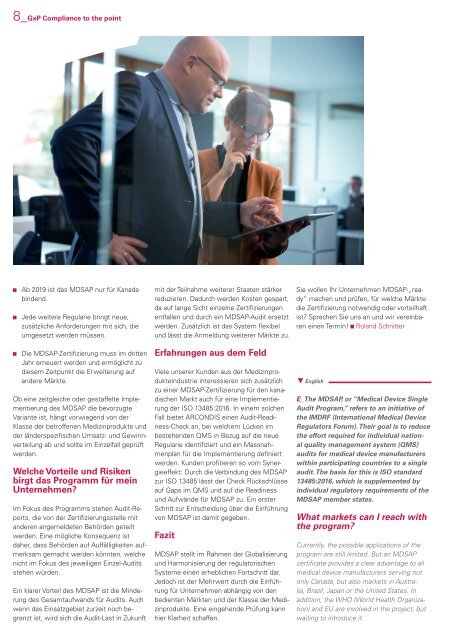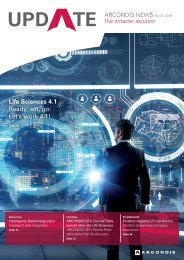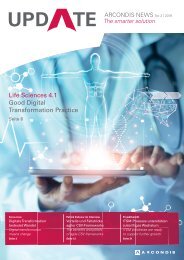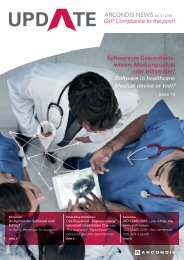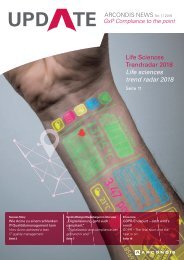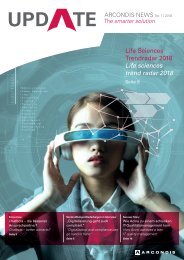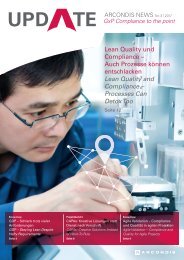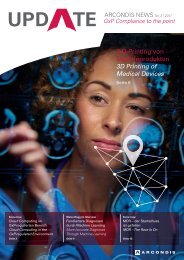ARCONDIS UPDATE No. 02|2018: GxP Compliance to the point
ARCONDIS Kundennewsletter für den Themenbereich Compliance in Medizinprodukteunternehmen
ARCONDIS Kundennewsletter für den Themenbereich Compliance in Medizinprodukteunternehmen
Erfolgreiche ePaper selbst erstellen
Machen Sie aus Ihren PDF Publikationen ein blätterbares Flipbook mit unserer einzigartigen Google optimierten e-Paper Software.
8_<strong>GxP</strong> <strong>Compliance</strong> <strong>to</strong> <strong>the</strong> <strong>point</strong> 9<br />
Ab 2019 ist das MDSAP nur für Kanada<br />
bindend.<br />
Jede weitere Regularie bringt neue,<br />
zusätzliche Anforderungen mit sich, die<br />
umgesetzt werden müssen.<br />
Die MDSAP-Zertifizierung muss im dritten<br />
Jahr erneuert werden und ermöglicht zu<br />
diesem Zeitpunkt die Erweiterung auf<br />
andere Märkte.<br />
Ob eine zeitgleiche oder gestaffelte Implementierung<br />
des MDSAP die bevorzugte<br />
Variante ist, hängt vorwiegend von der<br />
Klasse der betroffenen Medizinprodukte und<br />
der länderspezifischen Umsatz- und Gewinnverteilung<br />
ab und sollte im Einzelfall geprüft<br />
werden.<br />
Welche Vorteile und Risiken<br />
birgt das Programm für mein<br />
Unternehmen?<br />
Im Fokus des Programms stehen Audit-Reports,<br />
die von der Zertifizierungsstelle mit<br />
anderen angemeldeten Behörden geteilt<br />
werden. Eine mögliche Konsequenz ist<br />
daher, dass Behörden auf Auffälligkeiten aufmerksam<br />
gemacht werden könnten, welche<br />
nicht im Fokus des jeweiligen Einzel-Audits<br />
stehen würden.<br />
Ein klarer Vorteil des MDSAP ist die Minderung<br />
des Gesamtaufwands für Audits. Auch<br />
wenn das Einsatzgebiet zurzeit noch begrenzt<br />
ist, wird sich die Audit-Last in Zukunft<br />
mit der Teilnahme weiterer Staaten stärker<br />
reduzieren. Dadurch werden Kosten gespart,<br />
da auf lange Sicht einzelne Zertifizierungen<br />
entfallen und durch ein MDSAP-Audit ersetzt<br />
werden. Zusätzlich ist das System flexibel<br />
und lässt die Anmeldung weiterer Märkte zu.<br />
Erfahrungen aus dem Feld<br />
Viele unserer Kunden aus der Medizinprodukteindustrie<br />
interessieren sich zusätzlich<br />
zu einer MDSAP-Zertifizierung für den kanadischen<br />
Markt auch für eine Implementierung<br />
der ISO 13485:2016. In einem solchen<br />
Fall bietet <strong>ARCONDIS</strong> einen Audit-Readiness-Check<br />
an, bei welchem Lücken im<br />
bestehenden QMS in Bezug auf die neue<br />
Regularie identifiziert und ein Massnahmenplan<br />
für die Implementierung definiert<br />
werden. Kunden profitieren so vom Synergieeffekt:<br />
Durch die Verbindung des MDSAP<br />
zur ISO 13485 lässt der Check Rückschlüsse<br />
auf Gaps im QMS und auf die Readiness<br />
und Aufwände für MDSAP zu. Ein erster<br />
Schritt zur Entscheidung über die Einführung<br />
von MDSAP ist damit gegeben.<br />
Fazit<br />
MDSAP stellt im Rahmen der Globalisierung<br />
und Harmonisierung der regula<strong>to</strong>rischen<br />
Systeme einen erheblichen Fortschritt dar.<br />
Jedoch ist der Mehrwert durch die Einführung<br />
für Unternehmen abhängig von den<br />
bedienten Märkten und der Klasse der Medizinprodukte.<br />
Eine eingehende Prüfung kann<br />
hier Klarheit schaffen.<br />
Sie wollen Ihr Unternehmen MDSAP-„ready“<br />
machen und prüfen, für welche Märkte<br />
die Zertifizierung notwendig oder vorteilhaft<br />
ist? Sprechen Sie uns an und wir vereinbaren<br />
einen Termin! Roland Schnitter<br />
English<br />
E_The MDSAP, or “Medical Device Single<br />
Audit Program,” refers <strong>to</strong> an initiative of<br />
<strong>the</strong> IMDRF (International Medical Device<br />
Regula<strong>to</strong>rs Forum). Their goal is <strong>to</strong> reduce<br />
<strong>the</strong> effort required for individual national<br />
quality management system (QMS)<br />
audits for medical device manufacturers<br />
within participating countries <strong>to</strong> a single<br />
audit. The basis for this is ISO standard<br />
13485:2016, which is supplemented by<br />
individual regula<strong>to</strong>ry requirements of <strong>the</strong><br />
MDSAP member states.<br />
What markets can I reach with<br />
<strong>the</strong> program?<br />
Currently, <strong>the</strong> possible applications of <strong>the</strong><br />
program are still limited. But an MDSAP<br />
certificate provides a clear advantage <strong>to</strong> all<br />
medical device manufacturers serving not<br />
only Canada, but also markets in Australia,<br />
Brazil, Japan or <strong>the</strong> United States. In<br />
addition, <strong>the</strong> WHO (World Health Organization)<br />
and EU are involved in <strong>the</strong> project, but<br />
waiting <strong>to</strong> introduce it.<br />
Are <strong>the</strong>re country-specific<br />
differences?<br />
The MDSAP is endorsed and financed by<br />
participants of <strong>the</strong> IMDRF, but not all countries<br />
implement <strong>the</strong> program in <strong>the</strong> same<br />
way. With <strong>the</strong> exception of Canada, <strong>the</strong><br />
members use <strong>the</strong> MDSAP <strong>to</strong> supplement<br />
<strong>the</strong>ir existing systems.<br />
Country-specific regulations in detail:<br />
In Canada, certification <strong>to</strong> MDSAP will become<br />
manda<strong>to</strong>ry starting in January 2019<br />
for all companies serving <strong>the</strong> domestic<br />
market, replacing <strong>the</strong> existing Canadian<br />
program CMDCAS. During <strong>the</strong> current<br />
transition phase, Canada will accept both<br />
programs for registering class II, III and IV<br />
medical devices.<br />
Australia accepts MDSAP audit reports <strong>to</strong><br />
register or maintain registration statuses<br />
for both products and manufacturers. The<br />
MDSAP report does away with <strong>the</strong> need<br />
for routine inspections.<br />
In Brazil, results of <strong>the</strong> program are<br />
considered important input for pre- and<br />
post-market evaluation procedures. Specifically,<br />
<strong>the</strong> reports provide key information<br />
for technical evaluations, which speed<br />
up ANVISA-GMP certification for class III<br />
and IV medical devices. ANVISA can also<br />
permit two-year GMP recertification with<br />
an MDSAP audit. Previous ANVISA audits<br />
must not have yielded any anomalies for<br />
this <strong>to</strong> apply.<br />
In Japan, MDSAP audit reports submitted<br />
for pre- or periodic post-market QMS<br />
inspection are used as a pro<strong>to</strong>col. They<br />
serve as an exemption <strong>to</strong> on-site inspections<br />
and replace basic product registration<br />
documentation of <strong>the</strong> Marketing<br />
Authorization Holder (MAH).<br />
The United States recognizes <strong>the</strong> MDSAP<br />
as a substitute for routine inspections,<br />
provided findings are corrected in <strong>the</strong> allowed<br />
time and moni<strong>to</strong>red by certification<br />
authorities. However, no pre- or post-market<br />
approval inspections are replaced with<br />
<strong>the</strong> MDSAP.<br />
MDSAP – okay, but does it<br />
make sense for my company?<br />
Companies operating on <strong>the</strong> Canadian<br />
market have no way of getting around <strong>the</strong><br />
program, and ideally should have already begun<br />
preparing for certification. MDSAP also<br />
enables certification companies <strong>to</strong> combine<br />
certification with ISO 13485:2016, saving<br />
money and reducing required effort. However,<br />
you should still check what regulations<br />
benefit from <strong>the</strong> MDSAP. Registration for<br />
all available markets at once may leverage<br />
synergies, as similar requirements can be<br />
combined and implemented <strong>to</strong>ge<strong>the</strong>r, but<br />
this is not always <strong>the</strong> most efficient approach.<br />
Consider <strong>the</strong> following:<br />
Starting in 2019, MDSAP is only obliga<strong>to</strong>ry<br />
for Canada.<br />
Each new regulation brings new requirements<br />
<strong>to</strong> be implemented along with it.<br />
MDSAP certification has <strong>to</strong> be renewed<br />
every three years, and can be extended <strong>to</strong><br />
o<strong>the</strong>r markets at this <strong>point</strong>.<br />
Whe<strong>the</strong>r immediate or gradual MDSAP implementation<br />
is <strong>the</strong> preferred option mainly<br />
depends on <strong>the</strong> class of <strong>the</strong> affected medical<br />
devices as well as <strong>the</strong> country-specific<br />
distribution of sales and profit, and should be<br />
examined in individual cases.<br />
What advantages and risks<br />
does <strong>the</strong> program entail for my<br />
company?<br />
The program focuses on audit reports, which<br />
<strong>the</strong> certification authority can share with<br />
o<strong>the</strong>r registered authorities. But one possible<br />
consequence is that authorities could be<br />
made aware of anomalies <strong>the</strong> individual audit<br />
would not have focused on o<strong>the</strong>rwise.<br />
MDSAP also brings a clear advantage:<br />
reduced overall audit efforts. And though <strong>the</strong><br />
area of application is currently still limited,<br />
additional states joining in <strong>the</strong> future will<br />
reduce <strong>the</strong> audit load fur<strong>the</strong>r. In turn, this<br />
saves money, since individual certifications<br />
are no longer necessary in <strong>the</strong> long term as<br />
<strong>the</strong>y can be replaced with an MDSAP audit.<br />
The system is also flexible, allowing for o<strong>the</strong>r<br />
markets <strong>to</strong> register.<br />
Experience in practice<br />
Many of our cus<strong>to</strong>mers from <strong>the</strong> medical<br />
device industry are interested in being certified<br />
not only <strong>to</strong> MDSAP for <strong>the</strong> Canadian<br />
market but also <strong>to</strong> ISO 13485:2016. For such<br />
cases, <strong>ARCONDIS</strong> offers an audit readiness<br />
check that identifies gaps in <strong>the</strong> existing<br />
QMS with regard <strong>to</strong> <strong>the</strong> new regulations and<br />
defines an action plan for implementation.<br />
Cus<strong>to</strong>mers benefit from synergy effects: By<br />
linking MDSAP with ISO 13485, <strong>the</strong> check<br />
reveals any gaps in <strong>the</strong> QMS and indicates a<br />
readiness level for MDSAP – <strong>the</strong> first step in<br />
deciding whe<strong>the</strong>r <strong>to</strong> introduce MDSAP.<br />
Conclusion<br />
Within <strong>the</strong> context of globalization and harmonization<br />
of regula<strong>to</strong>ry systems, MDSAP<br />
represents major progress. But whe<strong>the</strong>r it<br />
offers companies added value depends on<br />
<strong>the</strong> markets <strong>the</strong>y serve and <strong>the</strong> class of <strong>the</strong><br />
medical devices. An initial check can establish<br />
clarity.<br />
You want <strong>to</strong> make your company “MDSAPready”<br />
and check what markets require or<br />
benefit from <strong>the</strong> certification? Do not hesitate<br />
<strong>to</strong> contact us and schedule an ap<strong>point</strong>ment!<br />
Roland Schnitter


